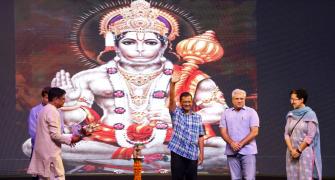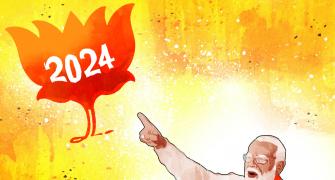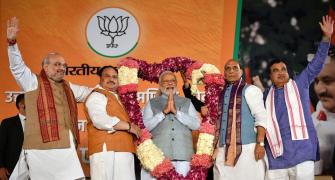The BJP can't be sure if it should celebrate that the old rival is fading or worry that new ones are rising.
Because the last thing the BJP wants to see is alternatives rising, if only to the Congress, observes Shekhar Gupta.

Between the 2009 and 2014 to 2019 general elections the Bharatiya Janata Party nearly doubled its national vote share.
The more remarkable thing is that on all evidence it is just as dominant now.
Meanwhile, India's economy has gone into a long-period stall since 2017, unemployment is at a historic high, rising inflation, especially fuel and edible oil prices, and there's been two years of pandemic pain.
Yet, the voters of the BJP, and more specifically Narendra Modi, are steadfast.
This isn't just the committed BJP voters, or the ones we might describe as core Hindutva voters.
That is the number that voted for the BJP in 2009 as well.
It's the additional new crores that the party attracted later whose commitment has looked unshakeable too.
They accept and fret over all the negatives, from the economy to unemployment and high prices.
But you ask them, who they will vote for, and the answer still is, Narendra Modi and the BJP.
It isn't counterintuitive if you listen to their reasons: Where, what and who is the alternative?
How can we vote for 'that' Rahul Gandhi and the Congress? And who wants another khichdi coalition?
If 'there is no alternative' is the reason for so many of these non-traditional BJP voters to stay put in that camp, some of it is beginning to change.
An alternative is now emerging.
But it isn't an alternative to the BJP and Narendra Modi.
An alternative is emerging instead, to the Congress. That's a critical political shift.
Even in this Modi epoch, a remarkable fact has stood out.
That the Congress has retained its minimum vote of around 20 per cent.
In the routs of 2014 as well as 2019, it was still more than any five parties (other than the BJP) put together.
It therefore remained the core of any future anti-BJP coalition or challenge.
Further, as long as it retained this loyal vote bank, it was impossible for any other party or coalition to challenge Narendra Modi.
That also gave the Congress its negotiating power, whether for coalition-forming or dealing with a Prashant Kishor. That ground is now eroding.
I understand that Congress people will be mad at me for saying this.
But they could also look at it another way.
While it is bad news for them, it isn't better for the BJP either.
Because they'd fear their non-traditional voters getting liberated from their chronic excuse of 'there's no alternative, can't vote for the Congress or the Gandhis'.
It follows that what's bad for the Congress is also not so good for the BJP.
So far the BJP has been smug knowing that the Congress has an unblemished record of not making a comeback once it loses power decisively in any state.
As we have argued in an earlier National Interest, despite having the second largest vote share nationally, it doesn't "own" any state. Some of that is changing.
There was a pattern established around 2014 when the party began getting wiped out of states it dominated.
The most remarkable losses were in Andhra Pradesh and Telangana.
In one, it now has zero elected presence and in the other, it is small, and declining.
If at all, in both these states, the BJP seems rising as the opposing pole to ruling regional leaders than the Congress.
Check out what so recently happened in the one state that the Congress could still have called its own to some extent, Punjab.
It lost out badly, but not to traditional rival, the Akali Dal.
It was routed because much of its vote was vacuum cleaned by yet another 'secular" challenger of the BJP, the Aam Aadmi Party.
Exit poll data shows about half of the Hindus and Dalits (traditionally with the Congress) moved to the AAP.
The BJP may have won just two seats, but it saw its main national challenger greatly diminished.
And, in a mixed blessing, saw a new, noisier, sharper, more populist and ruthless challenger begin rising in Arvind Kejriwal and the AAP.
How an AAP government is a challenge on a scale very different from that of the staid Congress, we are seeing play out in the Tajinder Bagga tamasha.
You've never seen a Congress state government, including in Punjab, do any such thing.
We pick straws in the political wind elsewhere.
In the recent Goa elections, the Congress dropped nearly 5 percentage points from its 2017 vote share despite the BJP being a particularly unpopular incumbent. Goans were angry with the BJP.
It is just that they looked for an alternative, not just to the BJP but also to the Congress.
Nearly 7 per cent voted for the AAP and more than 5 for the Trinamool Congress.
This was essentially the anti-BJP voters but unwilling to return to the Congress.
Add these to the Congress's 23.46, and BJP would be routed.
Even more recent are the Guwahati municipal elections.
Now Assam is a state that the Congress ruled for three terms until the BJP beat it.
They still fancy being a strong Opposition and hope to win back power the next time.
In the capital city and political heart of the state now, they were run so close by the AAP as to cause a fright.
The BJP swept the poll with 60 per cent vote share, leaving the Congress a distant second at 13.72.
But, snapping at its heels was AAP at 10.69.
Significantly, the AAP also won a solitary seat while the Congress scored a cipher.
Another little indication that an alternative is emerging in national politics, though not to the BJP but the Congress.
It isn't all about the AAP. It's about the inability of the Congress to retain even its most loyal vote where another acceptable option becomes available.
It was Jagan in Andhra, KCR in Telangana, the TMC in West Bengal and the AAP in Punjab and elsewhere lately.
How fragile the party's hold is also became evident in the recent Tamil Nadu local body elections.
An apples-to-apples comparison isn't possible because the Congress contested in partnership with big brother DMK. It secured 3.31 per cent of the vote.
But the BJP collecting more than 5 per cent all by itself would have alarmed it.
There is a traditional national party vote in Tamil Nadu which the Congress retained even though it never won the state by itself in the 60 years since 1962.
If the BJP vacuums a large part of it now, it will be a killer blow.
And if it loses the ability to bring in that 'national constituency' vote, what use it will be even as a junior partner for the DMK or the AIADMK?
One look at the political map would tell you the Congress, whether it's in power or not, still retains a significant foothold only in Rajasthan, Chhattisgarh, Madhya Pradesh, Haryana, Assam, Himachal Pradesh, Gujarat and Maharashtra.
It will need to watch elections in Himachal and Gujarat later this year closely because the AAP will be on its case.
Already, it has done well in the Surat municipal elections and also run the Congress close in Gandhinagar (AAP got 21 per cent vote to the Congress's 27.9).
In Maharashtra, ally NCP is gaining on it.
In Haryana it has its house in persistent disorder, Rajasthan has dissent, and nobody knows what it's doing in Gujarat except that the young leader it appointed there with much fanfare has exited, a bitter man now.
Here, then, is the irony. The BJP can't be sure if it should celebrate that the old rival is fading or worry that new ones are rising.
I'd say more of the latter. Because the last thing the BJP wants to see is alternatives rising, if only to the Congress.
By Special Arrangement with The Print










